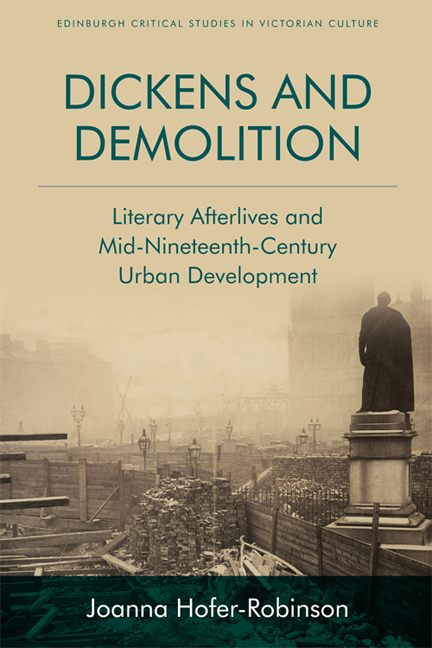Book contents
- Frontmatter
- Contents
- List of Illustration
- Acknowledgements
- Series Editor’s Preface
- Abbreviations and a Note on Editions
- Dedication
- Introduction
- 1 Charles Dickens and Metropolitan Improvements
- 2 Sets and the City: Staging London and Oliver Twist
- 3 Dickensian Afterlives and the Demolition of Field Lane
- 4 Paperwork and Philanthropy: Dickens’s Involvement in Metropolitan Improvement
- 5 From Sanit ary Reform to Cultural Memory: The Case of Jacob’s Island
- Coda
- Archival Sources and a Note on Method
- Select Bibliography
- Index
- Plate Section
2 - Sets and the City: Staging London and Oliver Twist
Published online by Cambridge University Press: 29 April 2021
- Frontmatter
- Contents
- List of Illustration
- Acknowledgements
- Series Editor’s Preface
- Abbreviations and a Note on Editions
- Dedication
- Introduction
- 1 Charles Dickens and Metropolitan Improvements
- 2 Sets and the City: Staging London and Oliver Twist
- 3 Dickensian Afterlives and the Demolition of Field Lane
- 4 Paperwork and Philanthropy: Dickens’s Involvement in Metropolitan Improvement
- 5 From Sanit ary Reform to Cultural Memory: The Case of Jacob’s Island
- Coda
- Archival Sources and a Note on Method
- Select Bibliography
- Index
- Plate Section
Summary
London playhouses competed to be the first to adapt from Charles Dickens's works. There were at least two adaptations of Oliver Twist (1837–9) on stage before Dickens had even completed the novel. The earliest known version was produced at the St James's Theatre in March 1838, where, only a month before, Dickens's own play, The Strange Gentleman, was performed. This anonymous dramatisation was a failure and the run lasted only one night. Then, on 21 May, Oliver Twist, or, The Parish Boy's Progress. A Domestic Drama, in Three Acts by C. Z. Barnett opened at the Pavilion Theatre with a little more success, running for a week. Although these productions did not have long runs, the demand for dramatisations of Oliver Twist is indicated by the flurry of adaptations produced immediately after Dickens published the complete novel on 9 November 1838, which ran simultaneously in different theatres for the rest of the year. Only ten days after the novel hit bookstalls, George Almar's dramatisation was opened at the Surrey Theatre. Hot on its heels were productions at Sadler's Wells and at the City of London Theatre, which both opened on 3 December. Before the end of the year Oliver Twist reached provincial houses, and by January 1839 it was being performed in the USA.
Even though the plays were produced at a similar moment, the differences between these early dramatisations of Oliver Twist reveal how the same text was mobilised in different contexts and to serve different interests. The dynamic re-presentation of Oliver Twist in early theatrical adaptations is thereby indicative of the malleability of Dickensian afterlives in nineteenth-century improvement debates. Similarly to rhetorical appropriations of his works, Dickens's Oliver Twist is fragmented and revised by processes of adaptation. Even as multiple theatres traded on the writer's fame by proclaiming the name ‘BOZ’ on playbills, unauthorised adaptation meant that Dickens lost control of his text. Playwrights irreverently reworked the novel in multiple directions to suit a theatre's preferred genre, or altered it in length to fit the bill on different nights. Oliver Twist appeared as both a major and a minor feature on playbills. For instance, in addition to the longer adaptations listed above, individual characters or incidents were extracted from the narrative as short interludes. One example is Bumble's Courtship.
- Type
- Chapter
- Information
- Dickens and DemolitionLiterary Afterlives and Mid-Nineteenth Century Urban Development, pp. 51 - 90Publisher: Edinburgh University PressPrint publication year: 2018



